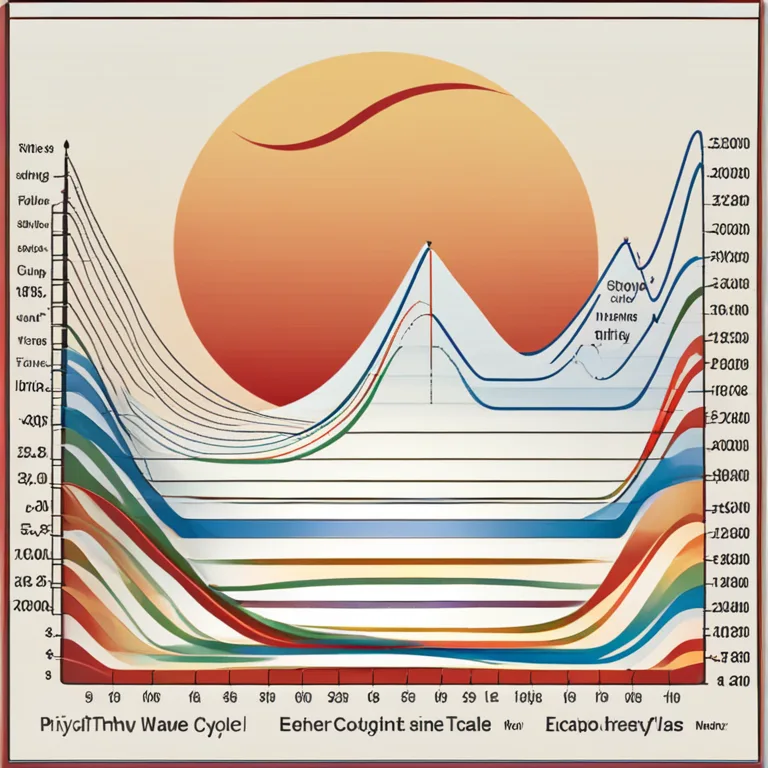
Calculating Biorhythms: A Step-by-Step Guide
Learn the process behind biorhythm calculations to understand your physical, emotional, and intellectual cycles for well-being.
article by Adrian Wallace
The Basis of Biorhythms
The concept of biorhythms finds its roots in a hypothesis that suggests that human life is influenced by rhythmic biological cycles. These cycles are believed to affect various aspects of a person's physical, emotional, and intellectual capabilities. Historically, the idea gained popularity in the late 19th century but has since been met with scientific skepticism. Despite this, biorhythms continue to intrigue individuals seeking unique insights into their personal well-being. As we forge deeper into the digital era, the calculation of biorhythms has shifted from manual charting to algorithmic computations accessible through various online platforms and apps.

Three Primary Cycles
The theory of biorhythms primarily focuses on three cycles: the physical, emotional, and intellectual. Each of these cycles has a different period: the physical cycle lasts for approximately 23 days, the emotional cycle 28 days, mirroring the lunar cycle, and the intellectual cycle 33 days. These periods are thought to start at an individual's birth and continue in a sine wave pattern throughout their life. The high points of these cycles signify periods of heightened ability, while the low points may indicate times of reduced capability or increased vulnerability.

Starting Your Calculation
To begin calculating one's biorhythms, the starting point is the individual's birth date. With advancements in biorhythm software in 2024, these calculations are more accessible and can account for leap years and calendar variations. Users simply input their birth date into a biorhythm calculator, which then uses this data as a baseline from which to measure up-to-date cycles.

The Calculation Method
The underlying principle behind biorhythm calculation is mathematical. Using the birth date as the starting point, the current date is then factored in to determine the number of days that have elapsed since birth. This figure is then divided by the period of each biorhythm cycle (physical - 23, emotional - 28, and intellectual - 33). The remainder of these divisions determines the current day within each cycle, and, when plotted on a graph, this provides a visual representation of the person's current state within each biorhythmic wave.

Interpreting the Results
Once the calculations are complete, interpreting the data is key. Days when the cycles cross the zero line are considered critical, and it is believed that individuals might experience greater challenges on these days. Days above the zero line can indicate stronger or more positive attributes related to the cycle, while days below may suggest potential weaknesses or challenges.
Real-world Applications and Technology
Advocates of biorhythms often use these calculations to help with decision-making, such as choosing the best days for important tasks or understanding potential mood swings. While traditional approaches involved manual charting, modern tools incorporate AI and machine learning to offer more nuanced interpretations of biorhythm data, integrating them with other wellness indicators and potentially enhancing the accuracy of predictions.
Biorhythms and Holistic Well-being
The concept of biorhythms extends into holistic wellness practices, encouraging individuals to tune into their body's natural rhythms. Although biorhythm theory lacks robust scientific evidence, many find value in its reflective nature, prompting a consciousness of one's personal cycles and perhaps contributing to lifestyle adjustments that foster greater overall health and balance.
Published: 1/4/2024
Modified: 1/4/2024
More predictions
Come back here soon to learn more about yourself and your future


Unlocking The Accuracy of Biorhythms
Delve into the realm of biorhythms to discover their reliability and impact on daily life in this insightful article.


The Impact of Biorhythm Compatibility
Discover the impact of biorhythm cycles on relationship dynamics and compatibility in our insightful article.


Biorhythms Practical Uses Unlocked
Discover the applications of biorhythms in everyday life, from personal well-being to professional optimization.